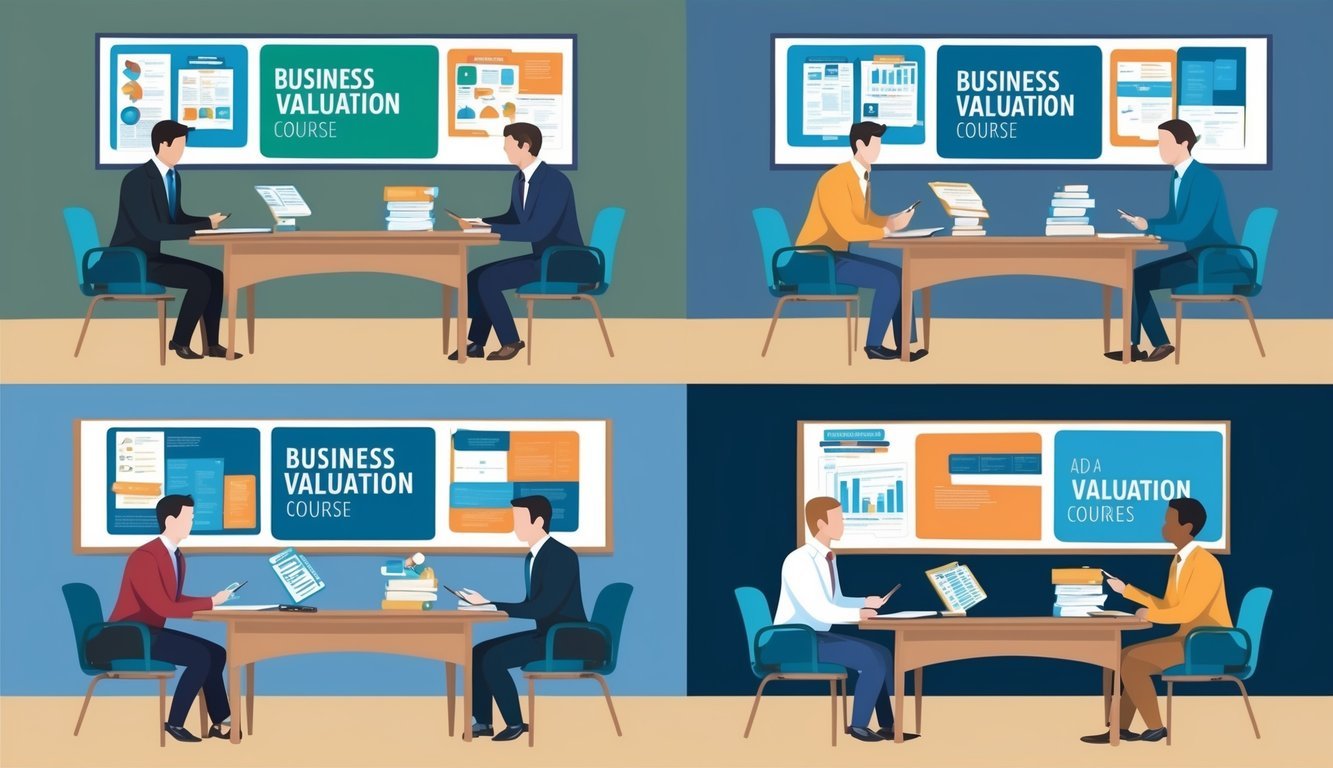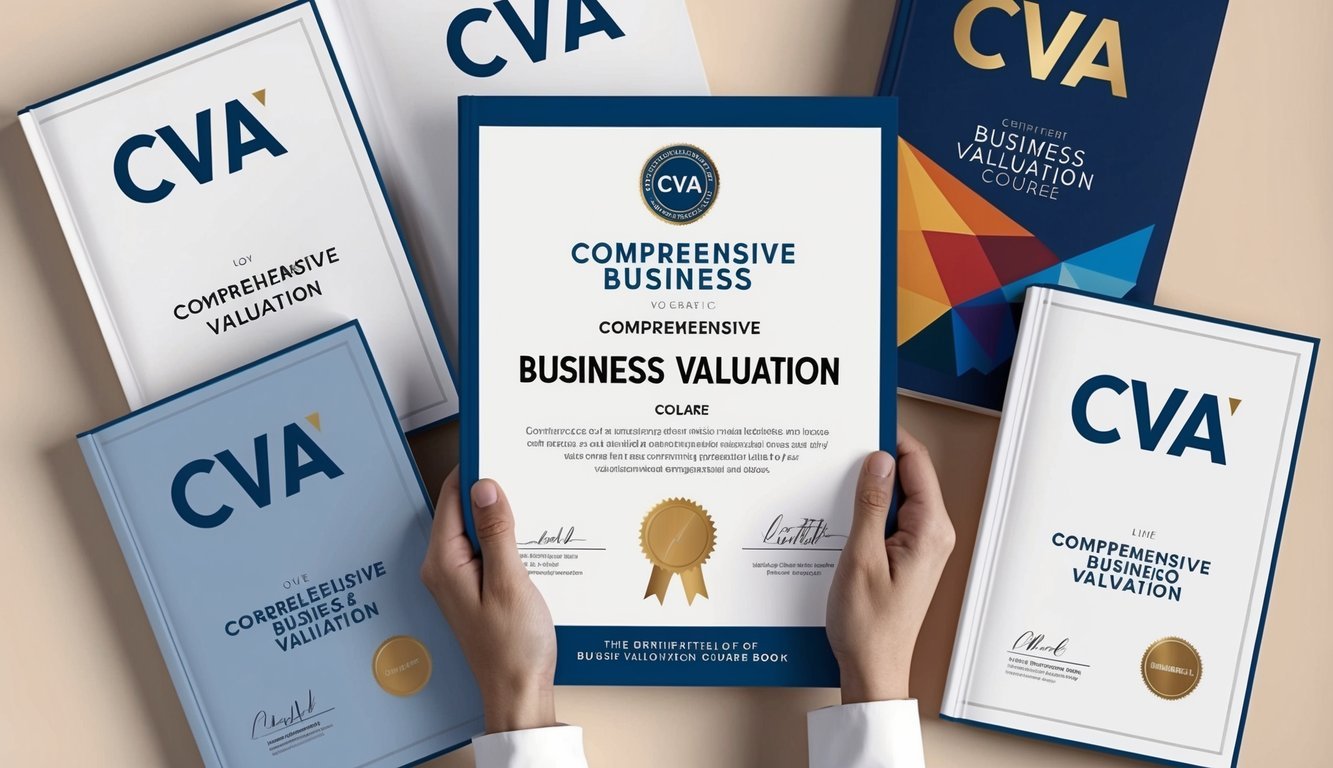Want to boost your financial know-how? Learning about business valuation might just be the ticket.
It’s your key to understanding what companies are really worth—a handy skill for investors, business owners, and finance pros alike.

You can find a ton of online courses designed to teach you the ins and outs of business valuation. These courses walk you through financial statements and introduce various methods to determine a company’s worth.
There are quick, introductory options and also more in-depth programs for those looking to dive deeper.
Taking a course can really equip you with the skills to make wiser business and investment decisions.
1) Business Valuation Masterclass by The New York Institute of Finance

If you want to learn how to value companies like a pro, check out the Business Valuation Masterclass from the New York Institute of Finance.
This online course lays out the basics of figuring out what businesses are truly worth.
You’ll tackle real-world case studies to see valuation in action, covering both public and private companies for a well-rounded perspective.
The beauty of this course? You can learn at your own pace.
There’s no need to commute or rearrange your whole schedule.
By the end, you’ll be familiar with various valuation methods, setting you up to make smarter investments or take your finance career to the next level.
The New York Institute of Finance is pretty reputable—they know how to teach finance in a way that sticks.
2) Certified Valuation Analyst (CVA) by NACVA

The Certified Valuation Analyst (CVA) is a great choice if you’re serious about mastering business valuation.
Offered by the National Association of Certified Valuators and Analysts (NACVA), this course is tailor-made for those wanting to get top-notch skills to evaluate a company’s worth.
The CVA covers all the essentials.
You’ll learn different valuation methods and even how to defend your findings.
It’s especially valuable for accountants, financial advisors, and anyone knee-deep in business finances.
One neat perk? The CVA is recognized worldwide and is accredited by big names in the industry.
When you earn your CVA, people will know you seriously know your stuff.
Of course, there are some requirements to get your CVA—you’ll need a college degree and some experience in business valuation.
But don’t worry if you’re in government; they’ve got special rules for you.
This course can be tough, but what you’ll learn is totally worth it.
You’ll walk away ready to tackle diverse business valuation challenges, whether you’re selling a business or involved in a lawsuit.
You’ll also pick up practical skills that apply across various industries.
Plus, you’ll even get a taste of cryptocurrency trading courses, helping you navigate the fast-paced digital asset landscape.
Talk about being prepared for anything!
3) Business Valuation Specialization by Coursera
If you’re aiming to get really good at valuing businesses, check out Coursera’s Business Valuation Specialization.
This program fits right for finance folks and business owners.
This specialization houses several courses covering key valuation aspects.
Kick things off with the Advanced Valuation and Strategy course, where you’ll learn to gauge company value and make savvy investment choices.
Next up is the Investment Banking: Financial Analysis and Valuation course.
You’ll pick up tips used by investment bankers when they analyze financial statements and assess company value.
Each course takes around 40 hours to complete, and you can pace yourself however you want.
The cherry on top? You’ll enjoy hands-on practice using real-world examples.
By the end of this specialization, you’ll be ready to value just about any company out there.
Plus, you’ll earn a certificate that you can proudly show off.
4) Business Valuation Workshop by Harvard University

Looking to learn business valuation from one of the world’s elite universities? Harvard’s got just the thing for you.
Their Business Analysis and Valuation course is a total game changer.
You’ll dive deep into financial statement analysis and learn to value companies like a seasoned pro.
The course allows you to assess corporate performance and how strategies play into a company’s value.
But it’s not just about the numbers.
You’ll grasp how a company’s operations affect its value.
If you’re thinking about entering finance or consulting, this course is right up your alley.
Even if you’re already in the field and looking to sharpen your skills, it’s perfect.
The best part? You don’t need to be a Harvard student to enroll.
The course is open to pros through Harvard’s Division of Continuing Education.
When you wrap up, you’ll have a firm grasp of valuation theories and the know-how to apply them in the real world.
You’ll be better equipped to make savvy business decisions and identify opportunities others might overlook.
Importance of Business Valuation
Business valuation is more than just numbers; it’s crucial for smart financial decision-making.
Getting a handle on what a company is worth helps you strike better deals.
Why Accurate Valuation Matters
Knowing a company’s true worth can make all the difference.
It helps you avoid overpaying when buying a business and ensures you get a fair price when selling.
Accurate valuation can:
- Secure better loans
- Attract more investors
- Guide smarter choices about growing your business
Getting the right numbers is essential, and corporate valuation courses can steer you in the right direction.
They save you from making costly mistakes.
Key Factors in Valuation
Many factors play into a company’s value, and you need to consider:
- Revenue
- Profits
- Assets
- Debts
- Growth potential
Business valuation courses teach you how to balance these elements, using techniques like:
- Comparative analysis with similar companies
- Looking at past deals
- Projecting future cash flow
Having these skills means you’ll be able to navigate when to buy, sell, or hold onto a company.
Understanding Different Valuation Methods
When it comes to valuing businesses, there are several methods to consider.
Each one takes a different approach to assess what a business is worth, giving you a fuller picture.
Income-Based Approach
This method is all about future earnings—how much cash a business can generate down the line.
You’re essentially forecasting cash flow.
A common way to do this is through the Discounted Cash Flow (DCF) method.
With DCF, you project future cash flows and calculate their worth today.
It’s like saying, “If this company is going to make $1 million next year, what does that mean right now?”
This approach works well for companies expected to see a lot of growth, but predicting the future can be a bumpy ride.
Market Comparisons
Think of this as comparing houses in a neighborhood.
You look at recent sales of similar companies or their stock market presence.
You might compare factors like:
- Price-to-earnings ratio
- Revenue multiples
- EBITDA multiples
This method is popular because it’s pretty straightforward.
Want to learn more? Consider checking out Harvard’s Business Analysis and Valuation course.
The flip side? Finding truly comparable companies can be a challenge.
Plus, market prices can be swayed by unrelated factors, messing with the real value.
Asset-Based Evaluation
This method focuses on what a company owns.
You’d add up all the company’s assets, subtract any debts, and get the net asset value.
This approach is useful for companies with a lot of physical assets, like real estate or equipment.
It’s also handy for businesses that maybe aren’t raking in cash but have valuable stuff on their balance sheet.
If you want to dive deeper into this method, check out the NYU Stern Advanced Valuation course.
A downside here is that this method doesn’t always capture the full picture, like brand value or customer loyalty, which can be tough to quantify but are incredibly valuable.
Frequently Asked Questions

Business valuation courses can be a bit puzzling.
Let’s tackle some common questions to clear things up.
What’s the best free online course for business valuation?
A good starting point is the Business Valuation Specialization on Coursera.
It’s a solid introduction to key concepts and methods.
While it’s not entirely free, you can audit it without a cost.
Which certification should I get if I want to be a pro at valuing businesses?
The Certified Valuation Analyst (CVA) is a popular pick.
It’s well-respected in the industry and teaches you advanced techniques while boosting your credibility.
Can you recommend some top-rated courses for learning business valuation?
Absolutely! The Business Valuation Masterclass at NYU Stern is taught by a renowned expert.
Harvard’s Business Valuation Workshop is also top-notch.
What are the usual methods pros use to figure out what a business is worth?
Most professionals rely on three main methods:
- Comparable company analysis
- Discounted cash flow (DCF)
- Precedent transactions
You’ll find these topics covered in detail in most comprehensive valuation courses.
What’s the most popular approach to valuing a company?
The DCF method is often seen as the gold standard, as it closely analyzes a company’s future cash flows.
Many experts prefer it for its thoroughness.
Are there any solid valuation courses on Coursera to check out in 2024?
It covers both the essential principles and advanced topics.
Plus, you’ll learn from experienced industry professionals and tackle real-world projects.

